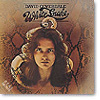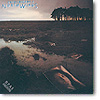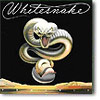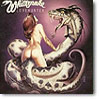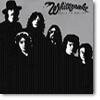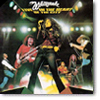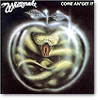|
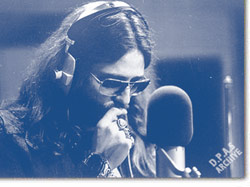 In March 1976 David Coverdale contacted ex-Snafu guitarist Micky Moody and asked for his help with a planned solo album. Work began sooner than planned when Deep Purple broke up at the end of a poorly received UK tour. Despite lacking the finance to put a new band together, Coverdale was still able to record the solo album while still under contract to Purple's management. Roger Glover produced and contributed some bass, with Moody on guitar, plus session musicians Lisle Harper on bass and Simon Phillips on drums. In March 1976 David Coverdale contacted ex-Snafu guitarist Micky Moody and asked for his help with a planned solo album. Work began sooner than planned when Deep Purple broke up at the end of a poorly received UK tour. Despite lacking the finance to put a new band together, Coverdale was still able to record the solo album while still under contract to Purple's management. Roger Glover produced and contributed some bass, with Moody on guitar, plus session musicians Lisle Harper on bass and Simon Phillips on drums.
The album ‘Whitesnake', which included some tracks originally written for Deep Purple’s follow-up to ‘Come Taste The Band’, proved an introspective and under-worked collection of material. Even so, the good-time r’n’b title track (co-written with Micky Moody) was to give Coverdale the inspiration for his first group. By early 1977, when it was released into a punk-saturated vacuum, work was already approaching completion on a much superior follow-up. ‘Northwinds’ is regarded as one of Coverdale’s very best, in turn understated and powerful, soulful, and well produced.
(photo:
David Coverdale, 1976)

 |
|
|
|
|
|
 |
|
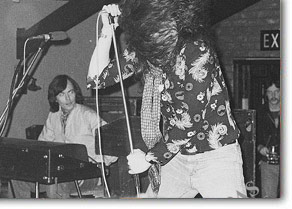 In
late 1977 Coverdale was finally in a position to begin putting
together a touring band to promote ‘Northwinds’, whose
release was held back to coincide. As a result the band was assembled
in haste, and with the full knowledge that personnel might later
change. Bernie Marsden joined from the ashes of Paice Ashton Lord
to compliment Micky Moody and provide a twin lead guitar approach. In
late 1977 Coverdale was finally in a position to begin putting
together a touring band to promote ‘Northwinds’, whose
release was held back to coincide. As a result the band was assembled
in haste, and with the full knowledge that personnel might later
change. Bernie Marsden joined from the ashes of Paice Ashton Lord
to compliment Micky Moody and provide a twin lead guitar approach.
Bernie was followed by his ex-Hammer band-mate Neil Murray on bass. In turn Murray roped in David Dowle on drums, and the troublesome keyboard spot was hurriedly filled by Brian Johnstone, who at least brought the desired Hammond sound to the group. Both Dowle and Johnstone had previously been members of Streetwalkers. The band’s debut 'back to the roots' tour (many in cramped intimate UK venues) was chaotically organised, but despite everything proved a triumph. In its aftermath it was decided that with the new band already writing and performing its own material on stage (‘Northwinds’ barely got a look-in), a true vinyl representation of what the new band was about had to be captured as soon as possible. First though, a new keyboard player was required.
(photo:
Brian Johnstone and David Coverdale, Back To The Roots Tour, 1978)

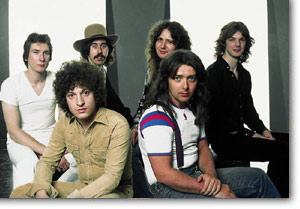 Brian Johnston had proved unsuitable for Whitesnake’s intense live performances, and Moody’s ex-Snafu colleague Pete Solley was quickly hired for the band’s first recording sessions. Brian Johnston had proved unsuitable for Whitesnake’s intense live performances, and Moody’s ex-Snafu colleague Pete Solley was quickly hired for the band’s first recording sessions.
The resulting ‘Snakebite’ EP included the old standard ‘Ain’t No Love (In The Heart Of The City)’, which was to become Whitesnake’s signature tune. After a follow-up round of live shows, and with a first group album almost complete, it was decided to replace Solley with Jon Lord, who agreed to join after hearing, and enjoying, the debut EP.
(photo.
Back row: David Dowle, Micky Moody, David Coverdale, Neil Murray.
Front row: Pete Solley, Bernie Marsden)
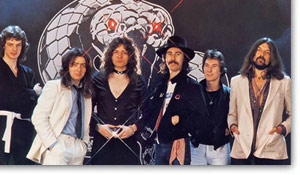 Jon Lord joined in time to overdub keyboards onto the new album, which was released as ‘Trouble’ in October 1978. It was generally viewed as a disappointment, largely failing to capture the energy which the band put across on stage. This was to become a recurring problem with a lot of the studio output. Jon Lord joined in time to overdub keyboards onto the new album, which was released as ‘Trouble’ in October 1978. It was generally viewed as a disappointment, largely failing to capture the energy which the band put across on stage. This was to become a recurring problem with a lot of the studio output.
The band’s stature
in the UK and Europe continued to grow apace however, aided
by Lord’s presence, and they ended the year with a headlining
show at London’s Hammersmith Odeon (soon to become their
second home). The show was recorded, and released in March 1980
(as a single edited album 'Live At Hammersmith') when the Japanese
decided that a live album would help the band's first tour there.
A regular Whitesnake occurrence was the latest line-up of the band touring in support of an album recorded by a previous line-up. David Dowle was increasingly viewed as the band’s weak link – being a jazz-rock drummer unsuited to Whitesnake’s heavy r’n’b - and was axed soon after recording the next album.
(photo.
Neil Murray, Bernie Marsden, David Coverdale, Micky Moody, David Dowle,
Jon Lord)

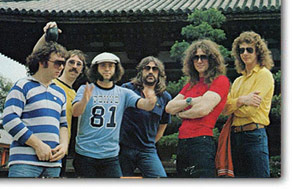 ‘Lovehunter’ appeared in October 1979, and in good time for the supporting tour Ian Paice eagerly stepped in to the band, strengthening the live sound, and increasing the ex-Purple quota to three. The others responded with "No I wasn’t in Deep Fucking Purple’ t-shirts! With ‘Lovehunter’ already in the racks, the new line-up’s first recording sessions were for Bernie Marsden’s ‘About Time Too’ solo album. ‘Lovehunter’ appeared in October 1979, and in good time for the supporting tour Ian Paice eagerly stepped in to the band, strengthening the live sound, and increasing the ex-Purple quota to three. The others responded with "No I wasn’t in Deep Fucking Purple’ t-shirts! With ‘Lovehunter’ already in the racks, the new line-up’s first recording sessions were for Bernie Marsden’s ‘About Time Too’ solo album.
The 1979 shows were possibly
the band’s peak live performances, and were followed up
in 1980 by their most consistent album to date in ‘Ready
& Willing’ and a #13 UK hit single in the shape of
the wonderfully taut ‘Fool For Your Loving’. In
the UK, Europe and Japan the band had hit the top, rounding
off the year at home with a headlining spot at the Reading Festival,
and another major album success with the 'Live In The Heart
Of The City' album, which added 1980 performances to the original
'Live At Hammersmith' to make up a double LP
American recognition remained a very long
way off; a late 1980 support slot with Jethro Tull barely made
a scratch. In 1981 complacency set in. The tremendously strong
‘Don’t Break My Heart Again’ single kept up
standards, but the new album ‘Come An’ Get It’
(despite reaching #1 in the UK) failed to improve on the band’s
previous output. With rows over money brewing, and with David
Coverdale feeling that the rest of the band lacked his ambition
to push Whitesnake onwards and upwards, he came to the decision
in early 1982 to disband the line-up entirely.
(photo.
Bernie Marsden, Micky Moody, Ian Paice, Jon Lord, David Coverdale, Neil Murray)
....
1976-78 David Coverdale Discography ....
....
1976-1981 David Coverdale and Whitesnake Discography ....
|
|
|
|
|
|
|
|
 |
|
|
UK
EPs / Singles:
Come
On / Ain't No Love.. / Bloody Mary / Steal Away : 1978*
Lie Down / Don't Mess With Me : 1978
The Time Is Right For Love / Come On (live) : 1979
Long Way From Home / Trouble (live)/
Ain't No Love.. (live) : 1979
Fool For Your Loving / Mean Business / Don't
Mess With Me : 1980
Ain't No Love.. (live)* / Take Me With You (live)
: 1980
Ready An' Willing / Nighthawk
/ We Wish You Well : 1980
Don't Break My Heart Again / Child Of Babylon : 1981
Would I Lie To You / Girl : 1981 |
|
 |
|
|
 |
|
Completing
The Collection:
The
Snakebite EP* was expanded to album length in the USA
by adding a selection of tracks from 'Northwinds'. The
live single b-sides all appeared on 'Live In Hammersmith'
(Japan only, March 1980), and in turn 'Live... In The
Heart Of The City' (November 1980)..
Whitesnake Mk4's first studio sessions were for Bernie
Marsden's 'About Time Too' solo album, alongside Cozy
Powell and Don Airey from Rainbow. Marsden's follow up
album 'Look At Me Now' was recorded in 1981 with the help
of Ian Paice, Jon Lord, and Neil Murray. Both albums have
been re-issued on CD by Purple Records, with radio session
bonus tracks, two of which feature David Coverdale on
vocals.
*
'Ain't No Love..' is a different version to the 'Live..
In The Heart Of The City' take, recorded in 1980 rather
than 1978. It was added to the 2007 CD remaster of 'Live...In The Heart Of The City'.
BBC recordings of Whitesnake's performances at the 1979 and 1980 Reading Festivals were included on the (expensive) 9xCD, 1xDVD, 1x vinyl EP boxset "The Sunburst Years", released by EMI in 2011. |
 |
|
....
1978-1981 Whitesnake On Video ....
|
 |
|
Completing
The Collection:
A 22 track DVD containing nine 1978-81 promos, four TV appearances from UK TV shows The Old Grey Whistle Test & Top Of The Pops, and eight live tracks from a show in Washington 1980 were included on the "The Sunburst Years boxset in 2011. Sadly there has been no separate release of the DVD. |
|
 |
|
|
|
 In March 1976 David Coverdale contacted ex-Snafu guitarist Micky Moody and asked for his help with a planned solo album. Work began sooner than planned when Deep Purple broke up at the end of a poorly received UK tour. Despite lacking the finance to put a new band together, Coverdale was still able to record the solo album while still under contract to Purple's management. Roger Glover produced and contributed some bass, with Moody on guitar, plus session musicians Lisle Harper on bass and Simon Phillips on drums.
In March 1976 David Coverdale contacted ex-Snafu guitarist Micky Moody and asked for his help with a planned solo album. Work began sooner than planned when Deep Purple broke up at the end of a poorly received UK tour. Despite lacking the finance to put a new band together, Coverdale was still able to record the solo album while still under contract to Purple's management. Roger Glover produced and contributed some bass, with Moody on guitar, plus session musicians Lisle Harper on bass and Simon Phillips on drums.





 I
I


 Brian Johnston had proved unsuitable for Whitesnake’s intense live performances, and Moody’s ex-Snafu colleague Pete Solley was quickly hired for the band’s first recording sessions.
Brian Johnston had proved unsuitable for Whitesnake’s intense live performances, and Moody’s ex-Snafu colleague Pete Solley was quickly hired for the band’s first recording sessions. 








